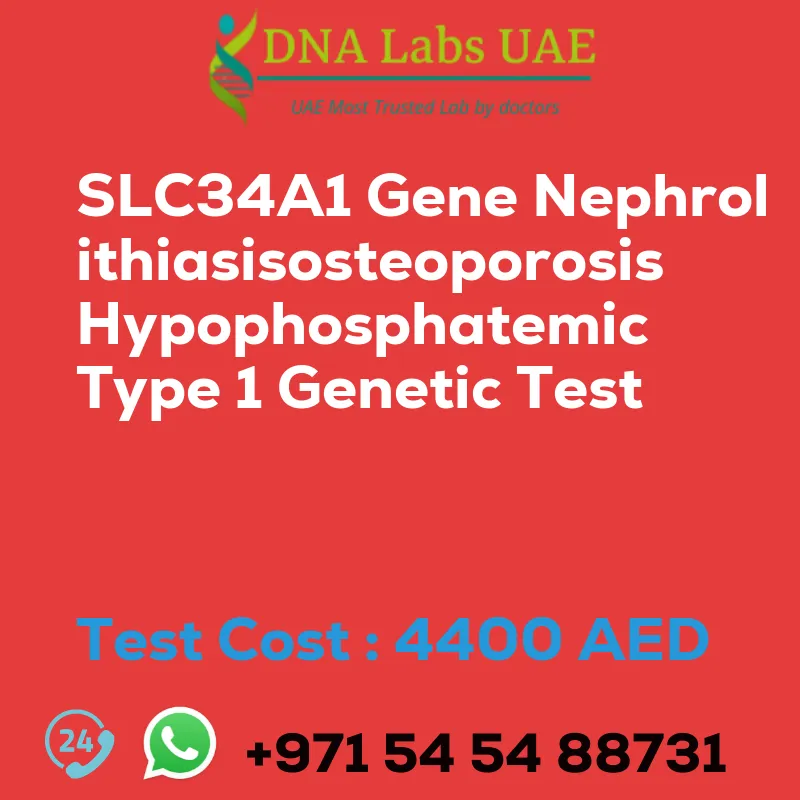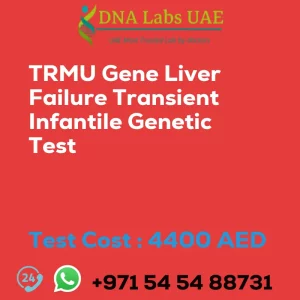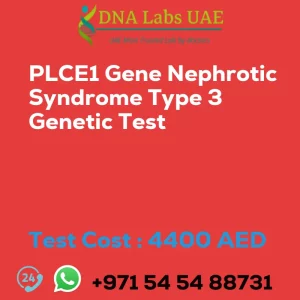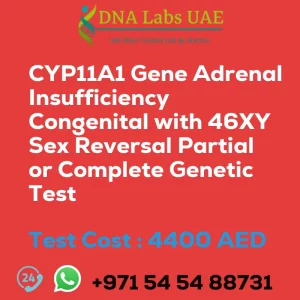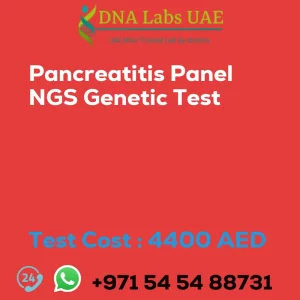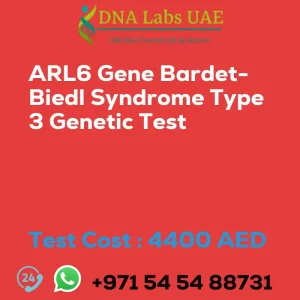SLC34A1 Gene Nephrolithiasisosteoporosis hypophosphatemic type 1 Genetic Test
Genetic testing plays a crucial role in diagnosing and understanding various genetic disorders. One such test is the SLC34A1 Gene Nephrolithiasisosteoporosis hypophosphatemic type 1 Genetic Test, offered by DNA Labs UAE.
Test Details
The SLC34A1 gene is responsible for encoding a protein called sodium-phosphate cotransporter 2a (NPT2a), which plays a crucial role in the reabsorption of phosphate in the kidneys. Mutations in this gene can lead to a condition called hypophosphatemic nephrolithiasis/osteoporosis, type 1. To diagnose this condition, DNA Labs UAE offers the SLC34A1 Gene Nephrolithiasisosteoporosis hypophosphatemic type 1 Genetic Test.
The test utilizes NGS (Next-Generation Sequencing) technology, which allows for the simultaneous analysis of multiple genes. By screening for mutations in the SLC34A1 gene, the test can provide valuable information for healthcare providers to better understand the underlying cause of nephrolithiasis/osteoporosis, type 1.
Test Components and Price
The SLC34A1 Gene Nephrolithiasisosteoporosis hypophosphatemic type 1 Genetic Test is priced at 4400.0 AED. The sample condition required for the test can be either blood, extracted DNA, or one drop of blood on an FTA card.
Report Delivery and Method
Once the sample is received, the report delivery takes approximately 3 to 4 weeks. The test utilizes NGS technology for accurate and comprehensive analysis.
Test Type and Doctor
The SLC34A1 Gene Nephrolithiasisosteoporosis hypophosphatemic type 1 Genetic Test falls under the category of Hepatology, Nephrology, and Endocrinology Disorders. It is recommended to consult a General Physician for this test.
Test Department and Pre Test Information
The test is conducted in the Genetics department of DNA Labs UAE. It is essential to provide the clinical history of the patient who is going for the test, especially if they have a family history of SLC34A1 Gene Nephrolithiasis/osteoporosis, hypophosphatemic, type 1. A Genetic Counselling session may be conducted to draw a pedigree chart of family members affected by this genetic condition.
Conclusion
The SLC34A1 Gene Nephrolithiasisosteoporosis hypophosphatemic type 1 Genetic Test offered by DNA Labs UAE is a valuable tool for diagnosing and understanding the underlying cause of nephrolithiasis/osteoporosis, type 1. By identifying mutations in the SLC34A1 gene, healthcare providers can make informed treatment decisions and provide appropriate genetic counseling to affected individuals and their families.
| Test Name | SLC34A1 Gene Nephrolithiasisosteoporosis hypophosphatemic type 1 Genetic Test |
|---|---|
| Components | |
| Price | 4400.0 AED |
| Sample Condition | Blood or Extracted DNA or One drop Blood on FTA Card |
| Report Delivery | 3 to 4 Weeks |
| Method | NGS Technology |
| Test type | Hepatology Nephrology Endocrinology Disorders |
| Doctor | General Physician |
| Test Department: | Genetics |
| Pre Test Information | Clinical History of Patient who is going for SLC34A1 Gene Nephrolithiasis/osteoporosis, hypophosphatemic, type 1 NGS Genetic DNA Test. A Genetic Counselling session to draw a pedigree chart of family members affected with SLC34A1 Gene Nephrolithiasis/osteoporosis, hypophosphatemic, type 1 NGS Genetic DNA Test gene SLC34A1 |
| Test Details |
The SLC34A1 gene is responsible for encoding a protein called sodium-phosphate cotransporter 2a (NPT2a). This protein plays a crucial role in the reabsorption of phosphate in the kidneys. Nephrolithiasis, also known as kidney stones, and osteoporosis are two conditions that can be associated with mutations in the SLC34A1 gene. Specifically, mutations in this gene can lead to a condition called hypophosphatemic nephrolithiasis/osteoporosis, type 1. NGS (Next-Generation Sequencing) genetic testing is a method used to analyze multiple genes simultaneously and identify potential mutations or variants that may be contributing to a specific condition. In the context of nephrolithiasis/osteoporosis, type 1, NGS genetic testing can be used to screen for mutations in the SLC34A1 gene to help diagnose the condition. By identifying mutations in the SLC34A1 gene, NGS genetic testing can provide valuable information for healthcare providers to better understand the underlying cause of nephrolithiasis/osteoporosis, type 1. This information can then be used to guide treatment decisions and provide appropriate genetic counseling to affected individuals and their families. |

